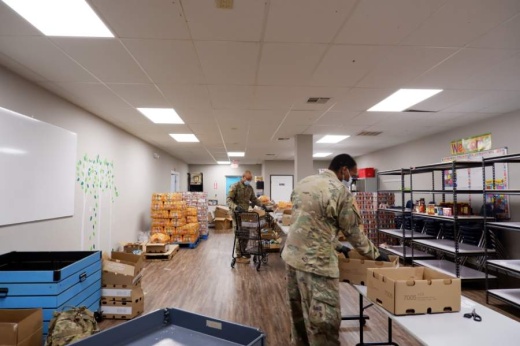Located at 5359 W. Richey Road, Houston, the nonprofit launched in 2013 and offers a variety of community programs, including a community center, counseling services and after-school clubs, among others.
However, according to Communications Director Hannah Connor, the organization has had to put a pause on these programs for the time being as a result of the novel coronavirus outbreak.
“Once the pandemic hit, what we were able to do in person was really restricted,” Connor said. “So right now, thanks to our partnership with the Houston Food Bank, our food pantry is booming,” Connor said.
In July of last year, Connor said Bridging for Tomorrow’s food pantry became a part of the Houston Food Bank’s Food for Change Market program, allowing the nonprofit to distribute fresh produce, dairy and meat to Food for Change clients.
On March 17—the same day Harris County and city of Houston officials announced a state of public health disaster in response to the COVID-19 outbreak—the nonprofit was told by the Houston Food Bank to distribute all food supplies to any person who came to collect, regardless if they had ever visited a food pantry or been on government assistance prior to the pandemic.
“We realized that families who were under-resourced before this [pandemic] now have huge challenges, and then, families who were making it month to month and were doing okay before are now bumped down to being thrown into chaos,” Connor said. “The biggest need that we're seeing is a need for food and access to enough nutritious food.”
Bridging for Tomorrow has since distributed 63,580 pounds of food from their food pantry to 1,227 families, essentially feeding 5,497 people. The nonprofit now distributes food on Tuesdays from noon-3 p.m. and Wednesdays from 9 a.m.-3 p.m. For updates, visit their website or their Facebook page.
People only need a form of identification to be eligible for food donations and can visit the food pantry once a week. In adherence to social distancing guidelines, Bridging for Tomorrow is currently utilizing curbside drive-thru services to distribute food, allowing families to remain in their car while food pantry staff load the groceries into vehicles.
According to Connor, each family receives 60 pounds of donated goods.
“What that means is that a family can come every week and get 60 pounds or $100 worth of groceries,” Connor said. “For the average household in this area, that equates to 85% of what they would be spending on food that month.”
In addition to lines and busy days at the food pantry, Connor said the coronavirus pandemic has presented specific challenges to how Bridging for Tomorrow has been able to support the community.
“I wasn't on staff when Harvey happened, but from what everyone's saying, the big difference is that during Harvey, coming together was what everyone turned to, and being able to be present for your neighbors was what everyone did,” Connor said. “Here, we can't be present in the same way.”
Despite this, Connor said the organization is already looking forward to helping folks recover from the pandemic once the community is able to come together again.
“We offer support groups and one-on-one counseling, [but] those things aren't happening at the moment because we're absolutely abiding by the recommendations for social distancing and groups not gathering,” Connor said. “But we're already trying to look and figure out what the community is going to need coming out of this—what kind of trauma these families [will] have experienced—and positioning ourselves to be ready to jump right back in and address those things.”





